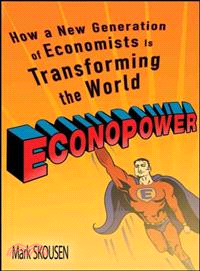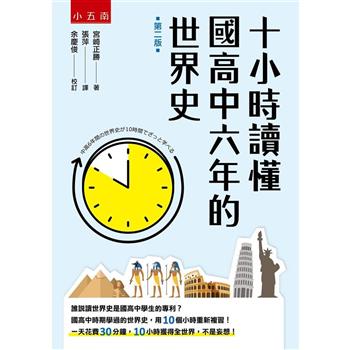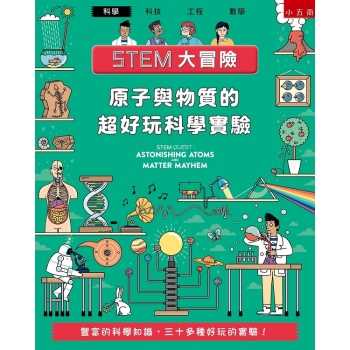| FindBook |
有 1 項符合
ECONOPOWER的圖書 |
 |
ECONOPOWER 作者:Mark Skousen 出版社:JOHN WILEY & SONS,LTD 出版日期:2008-03-06 規格: / 274頁 |
| 圖書館借閱 |
| 國家圖書館 | 全國圖書書目資訊網 | 國立公共資訊圖書館 | 電子書服務平台 | MetaCat 跨館整合查詢 |
| 臺北市立圖書館 | 新北市立圖書館 | 基隆市公共圖書館 | 桃園市立圖書館 | 新竹縣公共圖書館 |
| 苗栗縣立圖書館 | 臺中市立圖書館 | 彰化縣公共圖書館 | 南投縣文化局 | 雲林縣公共圖書館 |
| 嘉義縣圖書館 | 臺南市立圖書館 | 高雄市立圖書館 | 屏東縣公共圖書館 | 宜蘭縣公共圖書館 |
| 花蓮縣文化局 | 臺東縣文化處 |
|
|
- 圖書簡介
EconoPower will provide you with a firm understanding of the influence of modern economics and how it can be used to improve the world we live in. It offers practical advice on numerous personal financial matters—earning, saving, investing, and retiring—based on the breakthrough contributions of behavioral economists. And it looks at how economists are working successfully on issues such as public education, crime, and global warming. EconoPower also examines how a new economic philosophy may dominate the new millennium.
- 作者簡介
Mark Skousen is a professional economist, investment expert, university professor, and author of over twenty-five books. He has taught economics at Columbia Business School, Columbia University, and Rollins College. Currently, he holds the Benjamin Franklin Chair of Management at Grantham University. In honor of his work in economics, finance, and management, Grantham University renamed its business school, "The Mark Skousen School of Business." Since 1980, Skousen has been Editor in Chief of Forecasts & Strategies, a popular award-winning investment newsletter (www.markskousen.com). He is also Editor of The Worldly Philosophers Club, a weekly e-letter (www.worldlyphilosophers.com). Skousen is a former analyst for the CIA, a columnist for Forbes magazine, and past president of the Foundation for Economic Education (FEE) in New York. He earned his PhD in economics from George Washington University.
- 目次
Acknowledgments.
About the Author.
Introduction. A Golden Age of Discovery.
Part I. Personal Finance: Earning, Saving, Investing and Retiring.
Chapter 1. Economist Discovers a Painless Way to Triple Your Savings Rate: The $90 Billion Opportunity.
Chapter 2. Modern Portfolio Theory: Can You Beat Market?
Chapter 3. Yes, You Can Beat the Market…..With Less Risk.
Chapter 4. High-Return Investing: Lessons from Yale's Endowment Fund.
Chapter 5. How Chile Created a Worker-Capitalist Revolution.
Chapter 6. The Call for Social Security Reform.
Chapter 7. $4,000 a month from Social Security?
Chapter 8. How the Private Sector Solved its Own Pension Crisis.
Chapter 9. The Four Sources of Happiness: Is Money One of Them?
Part II. Economists Enter the Corporate Boardroom.
Chapter 10. Improving the Bottom Line with EVA.
Chapter 11. How Ludwig von Mises Helped Create the World's Largest Private Company.
Part III. Solving Domestic Problems.
Chapter 12. Look, Ma'am, No Traffic Jams.
Chapter 13. Patient Power: The New Consumer-Driven Medicine Plan.
Chapter 14. Back to Basics: Competition Enters the Classroom.
Chapter 15. Chicago Gun Show.
Chapter 16. Economists Catch Auction Fever.
Chapter 17. If You Built it (Privately)…..They Will Come: The Economics of Sports Stadiums.
Chapter 18. Who is Henry Spearman? The Economics of the Mystery Novel.
Part IV. Solving International Problems.
Chapter 19. Eco-nomics: Angry Planet or Beautiful World?
Chapter 20. The Population Bomb: Economists Enter the Malthusian Debate.
Chapter 21. A Private Sector Solution to Extreme Poverty.
Chapter 22. Poverty and Wealth: India vs. Hong Kong.
Chapter 23. How Real is the Asian Economic Miracle?
Chapter 24. Whatever happened to the Egyptians?
Chapter 25. The Irish Economic Miracle: Can We Grow Faster?
Chapter 26. The Marginal Tax Revolution: The Laffer Curve Goes Global.
Chapter 27. The Debate over Economic Inequality: The Rich Get Richer and the Poor Get……
Chapter 28. One Graph Says It All: The Development of the Economic Freedom Index
Chapter 29. Amazing Graph: Economists Enter Sacred Ground.
Chapter 30. Peace on Earth, Good Will Toward Men: The Case for Religious Competition.
Part V. Predicting the Future.
Chapter 31. New Yale Forecasting Model: Has the Irving Fisher Curse Been Lifted?
Chapter 32. Forecasting Elections: Economists Do it Better.
Chapter 33. What Drives the Economy and Stocks: Consumer Spending or Business Investment?
Chapter 34. The Midas Metal: A Golden Comeback.
Chapter 35. Is Another Great Depression Possible?
Chapter 36. Today's Most Influential Economist?
Chapter 37. Economics for the 21st Century.
Notes.
Index.
|






![塔木德:猶太人的致富聖經[修訂版]:1000多年來帶領猶太人快速累積財富的神祕經典 塔木德:猶太人的致富聖經[修訂版]:1000多年來帶領猶太人快速累積財富的神祕經典](https://media.taaze.tw/showLargeImage.html?sc=11100697818)




